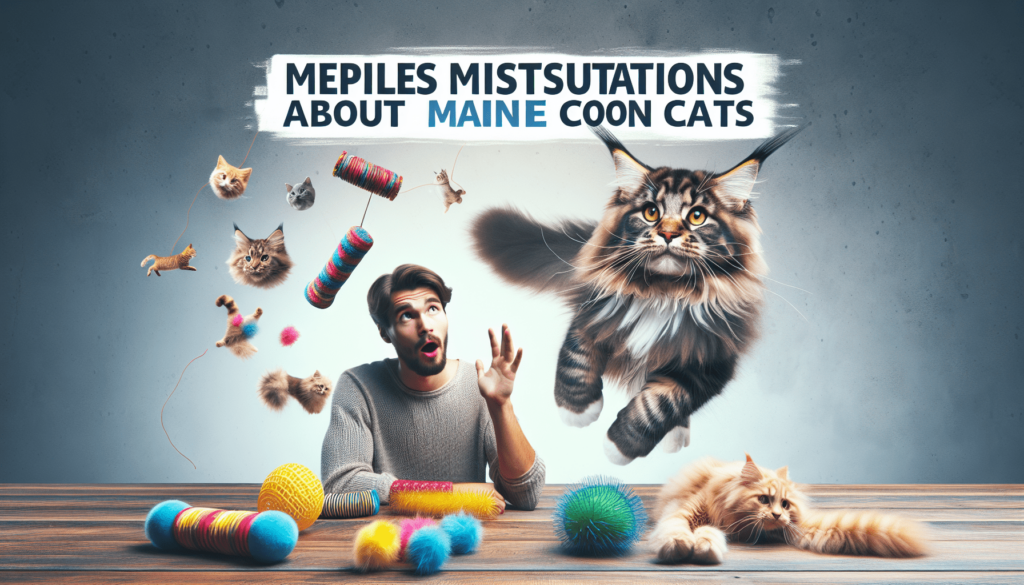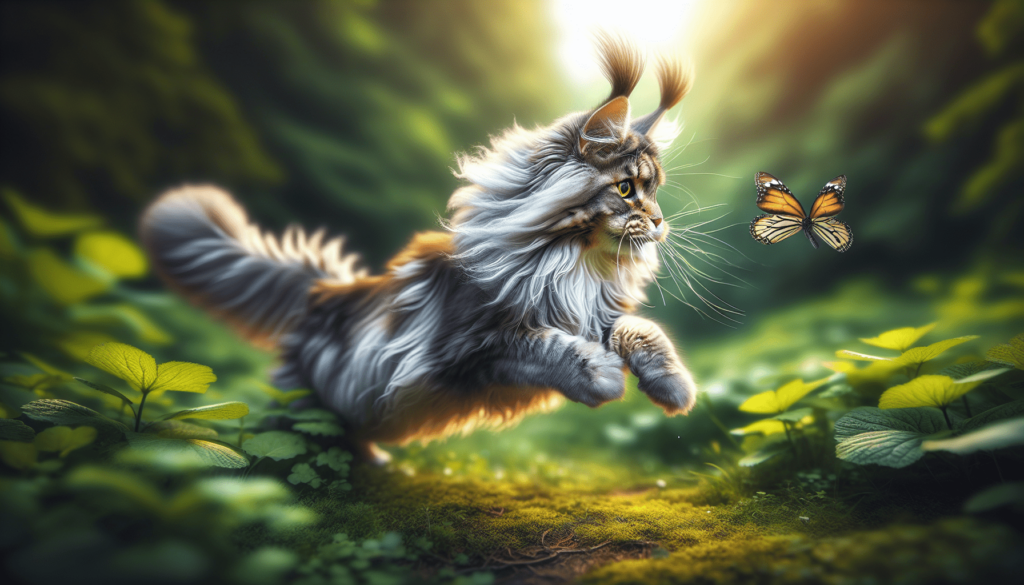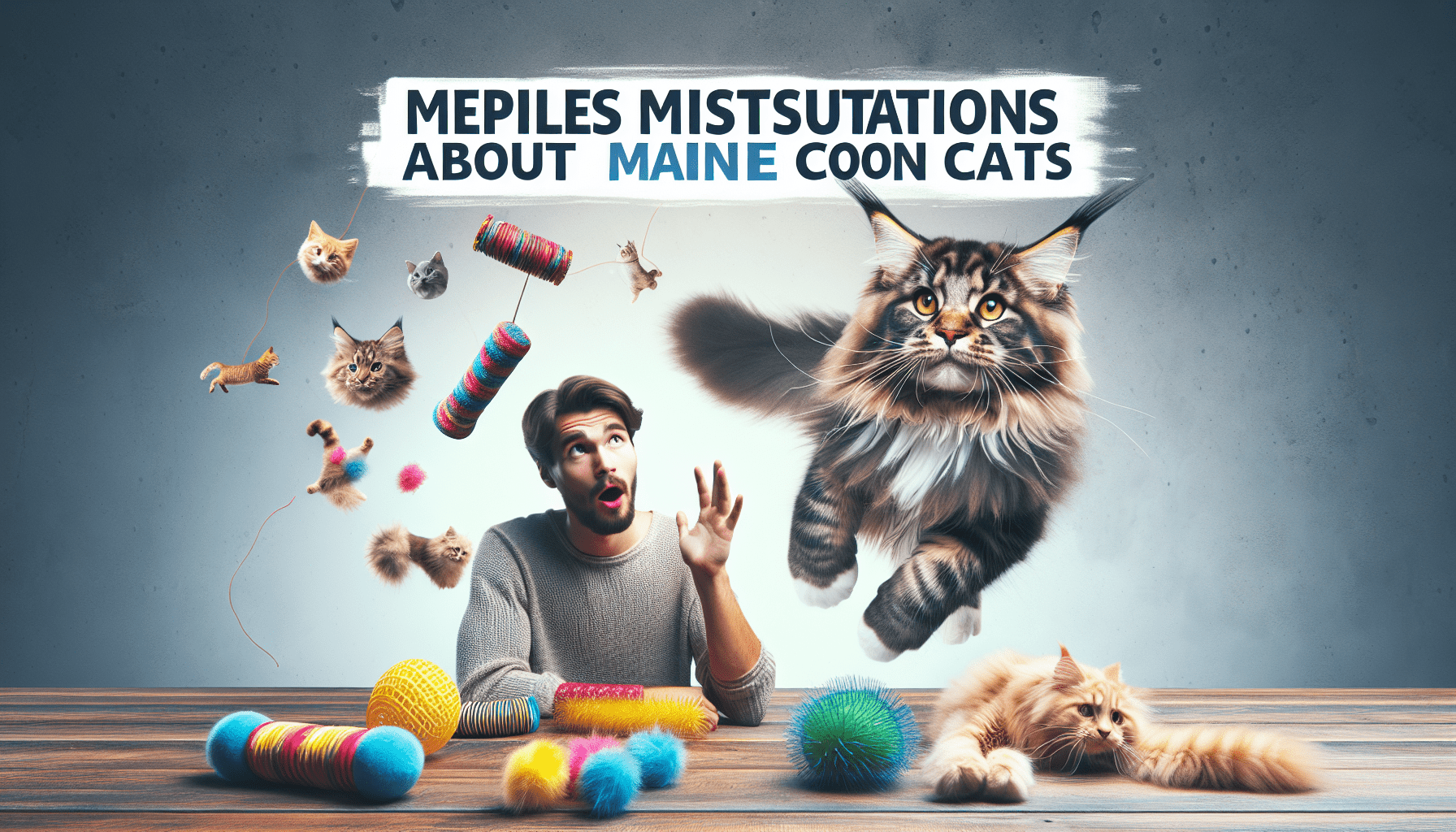If you’ve ever wondered whether Maine Coon cats are lazy, this article is here to shed some light on the matter. Maine Coon cats, known for their impressive size and gorgeous coats, often display a laid-back demeanor that may mistakenly be interpreted as laziness. But are they truly lazy by nature? In this article, we’ll explore the personality traits of Maine Coon cats and uncover whether their relaxed nature is a result of laziness or something else entirely. So grab a comfy seat and let’s find out what makes these fascinating felines tick!

Overview of Maine Coon Cats
Maine Coon cats are a popular and beloved breed known for their large size, friendly nature, and fluffy appearance. Originating in the United States, specifically the state of Maine, these cats have a fascinating history and unique physical characteristics that set them apart from other breeds. Additionally, Maine Coon cats have a distinctive personality that endears them to their owners and makes them a beloved companion.
Origins and history
The exact origins of Maine Coon cats are still a subject of debate among cat enthusiasts, but there are several theories regarding their ancestry. One popular theory suggests that Maine Coons are descendants of longhaired cats brought to America by European sailors. Another theory proposes that they are a crossbreed between local domestic cats and raccoons, although such a crossbreeding is biologically impossible. Despite the uncertainty surrounding their origins, it is generally agreed upon that Maine Coon cats have been a part of Maine’s rural communities for centuries.
Physical characteristics
Maine Coon cats are known for their impressive size and striking physical features. They are one of the largest domesticated cat breeds, with males often weighing between 13 to 18 pounds and females ranging from 8 to 12 pounds. Their bodies are muscular and substantial, covered in a long, water-resistant coat that helps them adapt to harsh weather conditions.
One of the most recognizable traits of Maine Coon cats is their distinctive tufted ears, which often have lynx-like tufts at the tips. Their large, expressive eyes come in various colors, including green, gold, and copper. Maine Coons also have a bushy tail, which can be as long as their bodies and is often carried in an elegant plume-like fashion.
Personality traits
Maine Coon cats have a reputation for being gentle giants with friendly and sociable personalities. They are known for their intelligence, adaptability, and affectionate nature towards their human family members. Maine Coons are generally good with children and other pets, making them an ideal choice for families.
These cats are known to be highly interactive and enjoy engaging with their owners. They often follow their humans around the house, wanting to be involved in their daily activities. Despite their large size, Maine Coons are typically quite gentle and docile, making them easy to handle and cuddle. Their playful and curious nature means they are always exploring their surroundings and finding ways to entertain themselves.
Defining Laziness in Cats
Understanding feline behavior
To determine if a cat is lazy, it is essential to understand their behavior patterns and instincts. Cats, including Maine Coons, are naturally inclined to conserve energy and engage in periods of rest and relaxation. This behavior is rooted in their evolutionary history as solitary predators, where energy conservation was crucial for survival.
Factors that contribute to laziness
Several factors can contribute to a cat’s perceived laziness. Changes in the environment, such as a lack of stimulation or the presence of excessive heat or cold, can affect a cat’s activity levels. Additionally, cats that are not provided with sufficient mental and physical stimulation may become disinterested in engaging with their surroundings.
Another contributing factor to laziness in cats can be their individual personality traits. Some cats naturally have lower energy levels, preferring to spend more time sleeping and resting. While laziness is often subjective, it is crucial to ensure that a cat’s overall health and well-being are not compromised.
Differentiating between low energy and laziness
It is important to differentiate between low energy levels and laziness in cats. Some cats, like the Maine Coon breed, tend to be more laid-back and less active compared to other breeds. This does not necessarily mean they are lazy but rather that they have a naturally calmer demeanor. It is crucial to take into account a cat’s overall behavior, including their engagement in playtime and overall well-being, before labeling them as lazy.
Maine Coon Cats: Active or Lazy?
Contradictory stereotypes
When it comes to Maine Coon cats, there can be contradictory stereotypes regarding their activity levels. Some people may perceive them as lazy due to their larger size and calm demeanor, while others recognize their playful and active nature. It is important to remember that each cat, regardless of breed, has its own unique personality and activity level.
Individual variation in activity levels
As with humans, cats have individual differences in their energy levels and activity preferences. While some Maine Coon cats may be more energetic and playful, others may prefer a more relaxed lifestyle. The key is to understand and appreciate each cat’s individual needs and provide an environment that allows them to express their natural behaviors.
Factors Influencing Activity Levels in Maine Coons
Age and life stages
Just like humans, Maine Coon cats go through different life stages that can impact their activity levels. Kittens are typically more active and have higher energy levels as they explore their surroundings and engage in play. As Maine Coon cats reach adulthood, their energy levels may naturally decrease, and they may become more laid-back. Similarly, as cats age, they may experience a decline in their activity levels due to the natural aging process.
Health and genetic factors
Health and genetics can also play a significant role in a Maine Coon cat’s activity levels. Cats with underlying health issues or genetic predispositions to certain conditions may have reduced energy levels or experience discomfort during physical activity. Regular veterinary check-ups and proactive management of any health concerns can help maintain a cat’s overall well-being and activity levels.
Environmental stimulation
The environment in which a Maine Coon cat lives can greatly influence their activity levels. Providing a stimulating environment with plenty of opportunities for play, exploration, and mental enrichment can help encourage a cat’s natural instincts and keep them engaged. Interactive toys, scratching posts, and vertical spaces, such as cat trees, can provide outlets for physical and mental stimulation.
Exercise and playtime
Regular exercise and dedicated playtime are essential for maintaining a Maine Coon cat’s overall health and activity levels. Engaging in interactive play sessions with toys that simulate hunting behavior can keep them physically and mentally stimulated. It is important to provide a variety of play activities, such as chasing toys, puzzle feeders, or laser pointers, to keep them engaged and prevent boredom.
Parenting and training
Effective parenting and training techniques can also influence a Maine Coon cat’s activity levels. Positive reinforcement training methods can encourage cats to engage in desired behaviors, such as using a scratching post or participating in playtime. Providing structure and routine can help establish healthy activity patterns and prevent laziness or excessive weight gain.
Common Behaviors of Maine Coons
Lap cats and snuggle bugs
Maine Coon cats are often referred to as “gentle giants” because of their affectionate and cuddly nature. They may enjoy curling up on their owner’s laps, seeking physical contact, and sharing moments of relaxation and comfort. Their love for snuggling and being close to their human companions makes them wonderful companions for those seeking a loving and affectionate cat.
Playful and curious nature
Despite their calm demeanor, Maine Coon cats have a playful and curious side that contributes to their charm. They may engage in various play behaviors, such as batting at toys, chasing after objects, or engaging in interactive play with their owners. Their curiosity often leads them to explore their surroundings and investigate new scents or objects, making for an entertaining and lively companion.
Preference for company
Maine Coon cats are notorious for their love of human company. They are known to be social cats and often crave the presence and attention of their owners. They enjoy participating in daily activities and will often follow their owners around the house or sit nearby, observing their actions. This preference for company makes them a popular choice for individuals or families seeking a feline companion that actively seeks social interaction.
Sleeping habits
Like all cats, Maine Coon cats require ample periods of rest and sleep. However, their larger size and slower metabolism may contribute to longer and more frequent periods of sleeping. It is not unusual for a Maine Coon cat to spend up to 16 hours a day sleeping. These extended sleep periods should not be mistaken for laziness but rather a natural behavior for cats to recharge their energy levels.

Creating a Stimulating Environment
Providing vertical space
Maine Coon cats often enjoy climbing and exploring their surroundings from higher vantage points. Providing vertical spaces, such as cat trees, shelves, or perches, can satisfy their natural instincts and give them a sense of security and territory. Vertical spaces also allow them to observe their environment and engage in exercise through climbing and jumping.
Interactive toys and puzzle feeders
To keep Maine Coon cats mentally and physically stimulated, it is essential to provide them with interactive toys and puzzle feeders. Toys that mimic prey behavior, such as feather wands or toys that can be chased and pounced on, can help fulfill their natural hunting instincts. Puzzle feeders and treat-dispensing toys can provide mental enrichment while simultaneously encouraging physical activity.
Scratching posts and cat trees
Maine Coon cats have a natural instinct to scratch, and providing appropriate scratching posts and surfaces is essential for their overall well-being. Scratching posts should be sturdy, tall enough for stretching, and made from materials that are appealing to cats, such as sisal or carpet. Cat trees that combine scratching posts with elevated platforms can provide both exercise and vertical space for climbing.
Access to outdoor spaces
Maine Coon cats are known to have an adventurous spirit and may enjoy spending time outdoors. However, it is important to ensure their safety by providing access to enclosed and secure outdoor spaces, such as a catio or screened-in porch. This allows them to experience the outdoors while minimizing potential dangers, such as traffic or exposure to harmful elements.
Variety in play activities
To prevent boredom and maintain a Maine Coon cat’s interest, it is crucial to provide a variety of play activities. This can include rotating toys, introducing new interactive games, or engaging in different types of play, such as puzzle-solving or agility training. Variation in play activities keeps cats mentally stimulated and prevents them from becoming disinterested or lazy.
Feeding and Exercise Regimen
Choosing a balanced diet
Maintaining a balanced diet is essential for a Maine Coon cat’s overall health and activity levels. It is important to select a cat food that meets their nutritional needs, taking into account their age, weight, and any specific dietary requirements. Consultation with a veterinarian can help determine the best diet for a Maine Coon cat and help prevent health issues related to improper nutrition.
Portion control and meal frequency
Portion control is important to prevent overeating and maintain a healthy weight in Maine Coon cats. Regularly measuring and monitoring food portions according to the feeding guidelines provided by the cat food manufacturer can help prevent weight gain or obesity. Additionally, the frequency of meals should be tailored to the individual cat’s needs, with multiple small meals or free-feeding options depending on their activity level and metabolism.
Incorporating exercise into daily routines
Regular exercise is crucial for maintaining a Maine Coon cat’s activity levels and overall health. Incorporating playtime into daily routines, such as interactive play sessions using toys or engaging in activities that encourage movement, can help keep cats physically active. Aim for at least 15-20 minutes of active playtime per day to help prevent laziness and promote a healthy lifestyle.
Use of catnip and other stimulants
Some Maine Coon cats may respond positively to catnip, which can be used as a tool to stimulate activity and playfulness. Catnip can be incorporated into play sessions or used in interactive toys to encourage cats to engage and move around. However, it is important to monitor their reaction to catnip and use it sparingly, as not all cats will respond to it or may have a negative reaction.
Recognizing Signs of Laziness or Health Issues
Excessive sleep and lack of interest
While Maine Coon cats are known for their affinity for sleep, excessive and prolonged periods of sleep can be a sign of lethargy or a more significant health issue. If a Maine Coon cat is consistently uninterested in engaging in play or other activities and spends an excessive amount of time sleeping, it may be worth consulting a veterinarian to rule out any underlying health concerns.
Weight gain or loss
Significant changes in weight, either through noticeable weight gain or loss, can be indicative of an underlying health issue or improper diet. Monitoring a Maine Coon cat’s weight regularly and adjusting their diet and exercise routine accordingly can help prevent laziness or potential health problems associated with weight fluctuations.
Changes in behavior or mood
Any sudden or significant changes in a Maine Coon cat’s behavior or mood should be closely observed. Cats that become withdrawn, irritable, or exhibit unusual aggression may be experiencing physical discomfort or underlying health issues. It is important to pay attention to these changes and consult a veterinarian to address and mitigate any potential health concerns.
Consulting a veterinarian
If a Maine Coon cat consistently exhibits signs of laziness or experiences significant changes in activity levels, it is advisable to consult a veterinarian. A veterinarian can perform a thorough examination, conduct appropriate tests, and offer professional advice on how to address and manage a cat’s activity levels and overall well-being. Regular veterinary check-ups are essential for maintaining a Maine Coon cat’s health and happiness.
Addressing and Preventing Laziness in Maine Coons
Balancing rest and physical activity
Finding the right balance between rest and physical activity is crucial for managing a Maine Coon cat’s activity levels. Ensuring they have ample opportunities for relaxation and sleep while incorporating regular playtime and exercise sessions is key. It is important to respect their individual needs and not force them into activities they may not enjoy or are physically incapable of.
Interactive play sessions
Interactive play sessions are an excellent way to keep Maine Coon cats physically and mentally stimulated. Engaging in interactive play using toys that promote natural hunting behaviors can elicit their natural instincts and provide the necessary exercise. Taking the time to bond and play with a Maine Coon cat can strengthen the human-cat relationship and prevent laziness or boredom.
Training and mental stimulation
Training and mental stimulation can help prevent laziness in Maine Coon cats by keeping their minds engaged and active. Positive reinforcement training methods can be used to teach tricks, commands, or engage in interactive games that stimulate their problem-solving abilities. Providing puzzle toys, treat-mazes, or hiding toys in different locations can also provide mental stimulation and prevent boredom.
Regular health check-ups
Regular health check-ups are essential for addressing and preventing laziness in Maine Coon cats. A veterinarian can assess their overall health, detect any underlying issues, and provide appropriate treatment or management plans. Routine vaccinations, parasite prevention, and dental care should also be included in their regular healthcare regimen to ensure optimal well-being.
Monitoring weight and nutrition
Maintaining a healthy weight and proper nutrition is crucial for preventing laziness in Maine Coon cats. Regularly monitoring their weight, adjusting portion sizes, and selecting the appropriate diet can help prevent excessive weight gain or obesity. Consulting with a veterinarian or veterinary nutritionist can help ensure they are receiving the necessary nutrients and caloric intake for their individual needs.
Conclusion
Maine Coon cats, with their unique blend of charisma, affectionate nature, and distinctive appearance, continue to captivate cat lovers around the world. While they may be perceived as lazy due to their larger size and calm demeanor, it is important to understand and appreciate the individual differences and needs of each cat. By providing a stimulating environment, incorporating regular exercise and playtime, monitoring their health, and respecting their individual preferences, Maine Coon cat owners can promote a healthy and happy lifestyle for their beloved feline companions.
